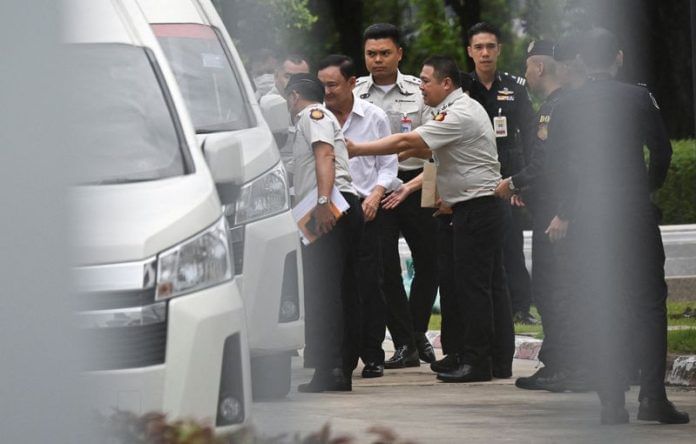By Panarat Thepgumpanat and Panu Wongcha-um
BANGKOK (Reuters) – Thailand’s influential former Prime Minister Thaksin Shinawatra was sent to prison on Tuesday after the Supreme Court ruled his hospital detention was a ploy to avoid jail, a major blow for a powerful family that has dominated politics for two decades.
The polarising billionaire had spent only a few hours in prison upon his return from 15 years of self-exile in August 2023 before he was hospitalised after complaining of heart trouble and chest pains, prompting widespread scepticism and public outrage.
His eight-year sentence for conflicts of interest and abuse of power while prime minister from 2001-2006 was commuted to one year by the king and Thaksin was released on parole after just six months of detention, the entirety of which he had spent in the VIP wing of a hospital.
The court on Tuesday said Thaksin must go back to serve a year in prison as both he and his doctors had intentionally prolonged his hospital stay with minor surgeries that were unnecessary.
“The defendant knew the facts or was aware the situation was not a critical emergency. The defendant only had a chronic condition that could be treated as an outpatient and did not require hospitalisation,” it said.
In images screened live on television, a van carrying Thaksin arrived at a Bangkok jail soon after a ruling that has gripped the country, the latest drama in two weeks of political chaos that saw the abrupt end of yet another Thaksin-backed populist government.
The 76-year-old powerbroker is experiencing a political reckoning after his daughter and protégé, Paetongtarn Shinawatra, was sacked as prime minister by a court on August 29 – the sixth premier from or backed by the Shinawatra family to be removed by the judiciary or military.
Paetongtarn’s government fell on Friday, outmanoeuvred by challenger Anutin Charnvirakul, who was elected prime minister by parliament in a humiliating defeat for Thaksin’s once unstoppable Pheu Thai party, which won five of the past six elections.
Thaksin, who has loomed large over Thai politics throughout a quarter of a century of turmoil, is Thailand’s first former prime minister to be sent to prison.
COLLISION COURSE
He accepted the verdict and said he had proudly served his people by raising living standards and changing the dynamic of Thailand’s democracy.
“I may no longer have freedom, but have freedom of thought to create benefit for the country and people,” he said on social media.
A policeman-turned-telecoms magnate, Thaksin and his parties won the hearts and votes of millions of working class Thais with populist giveaways from cash handouts and community loans to generous farm subsidies and universal healthcare.
But his soaring popularity and brash character put him on a collision course with an old guard of conservatives, generals and old money families with sway over key institutions, and an eagerness to clip his wings.
Thailand’s incoming prime minister Anutin, who was once a member of Thaksin’s party and served in two of his cabinets, said he did not want to see him jailed.
“I am saddened, I sympathise with him,” Anutin said.
“For someone who has governed the country, I don’t want him to face something like this.”
Thaksin’s daughter and ousted prime minister Paetongtarn was emotional as she emerged from the court, moments before her father was taken to a corrections department van bound for jail.
She said she was proud of her father for creating history, but worried about his welfare.
“Me and my family are concerned,” she told reporters. “This is quite heavy.”
Ubon Ratchathani University political scientist Titipol Phakdeewanich said that, despite the verdict and Shinawatra family’s declining influence, the indomitable Thaksin would still attempt to call the shots in politics.
“It doesn’t mean that he would completely withdraw from politics. He’ll still likely play a role within Pheu Thai,” he said.
“There are still legal ways to cut his sentence. And we have seen that he tried everything to stay out of jail.”
(Reporting by Panarat Thepgumpanat, Kitiphong Thaicharoen, Chayut Setboonsarng, Panu Wongcha-um, Devjyot Ghoshal and Orathai Sriring; Writing by Martin Petty; Editing by John Mair and Alex Richardson)
Disclaimer: This report is auto generated from the Reuters news service. ThePrint holds no responsibility for its content.




